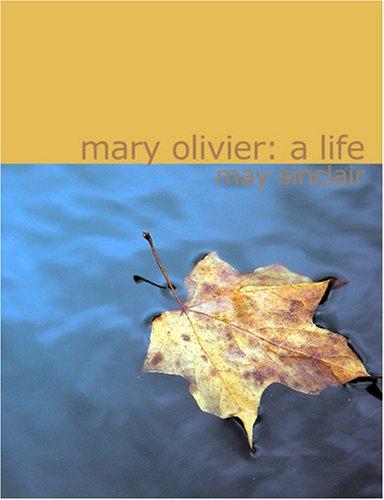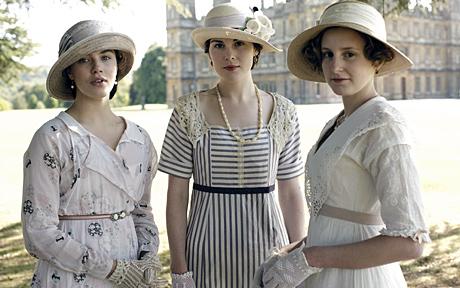 by Courtney Hilden
by Courtney Hilden
Mary Olivier: A Life by May Sinclair, is exactly that: the life story (though, interestingly, not necessarily her death) of the title character, who comes of age in Victorian England, struggling with an unsympathetic family, uncaring men, and a passion for intellectual pursuits.
The writing is marvelous. Like The Awakening, the novel begins as the main character is just swimming out of consciousness, and the reader moves through the first part of the book as if in coming out of a dream, becoming more aware of details as the story progresses. Sinclair, who coined the term "stream of consciousness," gives a lovely example of the technique that has so famously become a part of modern novels. The novel is incredibly impressive just because of the writing.
Mary Olivier is often compared to Jane Eyre. Both novels feature smart, meditative young women growing up in Victorian England. Because Jane Eyre is often considered a cult masterpiece by feminist scholars, I wanted to briefly compare the two characters, Mary and Jane, and to write about the issue of control within the novels.
Mary's and Jane's families, especially the women in those two families, attempt to control the main characters. Mary's mother is a Mommy Dearest: passive aggressive, inducing guilt trips, and manipulating her daughter, even when Mary is middle-aged.
 She disapproves of Mary's love of German, poetry, philosophy, and other subjects, so she takes books away from her. She hates that Mary is an atheist, so she constantly nags her about her beliefs and makes Mary read the Bible to her. She does not want her daughter to get married, so she continually sabotages any relationships Mary has with men. She isolates Mary alone in a home with her for decades, where Mary has little interaction with others, cannot do what she likes, and becomes increasingly cowed by her mother. This is the one of the things that was anti-feminist about the novel: as a young woman, Mary fights this oppression, but eventually allows herself to be controlled. It gets to the point where her mother no longer needs to throw her weight around; Mary makes choices based on her mother's "needs." Like a prisoner who has been watched for too long, she polices herself. Jane, of course, never knows her mother, though other women in her life (such as her aunts and her female cousins) attempt to control her. For the most part, Jane does not let them.
She disapproves of Mary's love of German, poetry, philosophy, and other subjects, so she takes books away from her. She hates that Mary is an atheist, so she constantly nags her about her beliefs and makes Mary read the Bible to her. She does not want her daughter to get married, so she continually sabotages any relationships Mary has with men. She isolates Mary alone in a home with her for decades, where Mary has little interaction with others, cannot do what she likes, and becomes increasingly cowed by her mother. This is the one of the things that was anti-feminist about the novel: as a young woman, Mary fights this oppression, but eventually allows herself to be controlled. It gets to the point where her mother no longer needs to throw her weight around; Mary makes choices based on her mother's "needs." Like a prisoner who has been watched for too long, she polices herself. Jane, of course, never knows her mother, though other women in her life (such as her aunts and her female cousins) attempt to control her. For the most part, Jane does not let them.
Then, there are of course, the men and how they attempt to control both characters. For Mary, there are multiple men that she considers for suitors: Maurice Jourdain, Lindley Vickers, and Richard.
 All of them disappoint her in the end. Jourdain likes her as a little girl and pays for her education. He finds that he does not like her with a real mind and that she is too headstrong, and, after being unable to change her, he marries someone else. Vickers courts her while simultaneously sleeping with another young woman in the village. And Richard grows impatient with her and her issues with her mother, so he too marries someone else. And Mary never marries, which to many readers might seem sad, but the novel ends happily, with her, in third person narration discussing how the little things in her life make her happy. Jane's Mr. Rochester infamously treats her with disdain, manipulating her and lying to her about his own marital status. And St. John tries to compel her to marry him and be his sidekick on his suicidal missionary trip. And Jane marries Mr. Rochester, who becomes less handicapped because of her in the epilogue of the novel.
All of them disappoint her in the end. Jourdain likes her as a little girl and pays for her education. He finds that he does not like her with a real mind and that she is too headstrong, and, after being unable to change her, he marries someone else. Vickers courts her while simultaneously sleeping with another young woman in the village. And Richard grows impatient with her and her issues with her mother, so he too marries someone else. And Mary never marries, which to many readers might seem sad, but the novel ends happily, with her, in third person narration discussing how the little things in her life make her happy. Jane's Mr. Rochester infamously treats her with disdain, manipulating her and lying to her about his own marital status. And St. John tries to compel her to marry him and be his sidekick on his suicidal missionary trip. And Jane marries Mr. Rochester, who becomes less handicapped because of her in the epilogue of the novel.
Jane Eyre is a complicated novel when we consider the feminism question. On one hand, it is hard to see her as much of a feminist character or hero because she marries a man who shows her little respect, but one the other hand, she is otherwise fiercely independent when it comes to anyone else in her life. The novel suggests that one should not give up one's independence until the man of your dreams comes along. Mary, conversely, inevitably spurs the advances of all her suitors by being herself, and yet she becomes completely controlled by her mother in her later years. Mary is only happy after her mother conveniently dies. Both Jane and Mary claim to be happy at the end of their novels, and yet I am more convinced that Mary is and will continue to be relatively happy, since she has lost the last controller (her mother) of her life.
Mary Olivier is a fascinating novel in terms of its depiction of women's lives (other female characters make surprising choices not covered in this review). The novel is a great choice not only for Jane Eyre fans, but readers who enjoy Victorian and modernist literature, particularly those who enjoyed The Awakening, "The Yellow Wallpaper" or the works of Virginia Woolf. (The novel was published in 1919 but is set much earlier.)
 Although I might be later embarrassed to admit this, I am an A.F.I. fan. I first became aware of them when they were mostly a punk band, and I liked the supernatural melodrama of their album The Art of Drowning, which struck me as a perfect soundtrack to shows like Buffy the Vampire Slayer. Later on, when they released their Sing the Sorrow, I was impressed by the breath of influences (80s neoromantics, metal, punk, goth, pop) and their lyrical content, which focused on the same apocalyptic themes but with more imagery. In songwriting, it is so easy to tell listeners; it is so much harder to show them. Then Decemberunderground came out, and I was so disappointed by the B-side-esque quality of the most of the music, I was simply to afraid to try their next album, Crash Love. If it was bad, it would break my heart, because then it meant that A.F.I. was no longer the band I had loved. So I put off listening to it, even though I purchased it in late 2009.
Although I might be later embarrassed to admit this, I am an A.F.I. fan. I first became aware of them when they were mostly a punk band, and I liked the supernatural melodrama of their album The Art of Drowning, which struck me as a perfect soundtrack to shows like Buffy the Vampire Slayer. Later on, when they released their Sing the Sorrow, I was impressed by the breath of influences (80s neoromantics, metal, punk, goth, pop) and their lyrical content, which focused on the same apocalyptic themes but with more imagery. In songwriting, it is so easy to tell listeners; it is so much harder to show them. Then Decemberunderground came out, and I was so disappointed by the B-side-esque quality of the most of the music, I was simply to afraid to try their next album, Crash Love. If it was bad, it would break my heart, because then it meant that A.F.I. was no longer the band I had loved. So I put off listening to it, even though I purchased it in late 2009.







